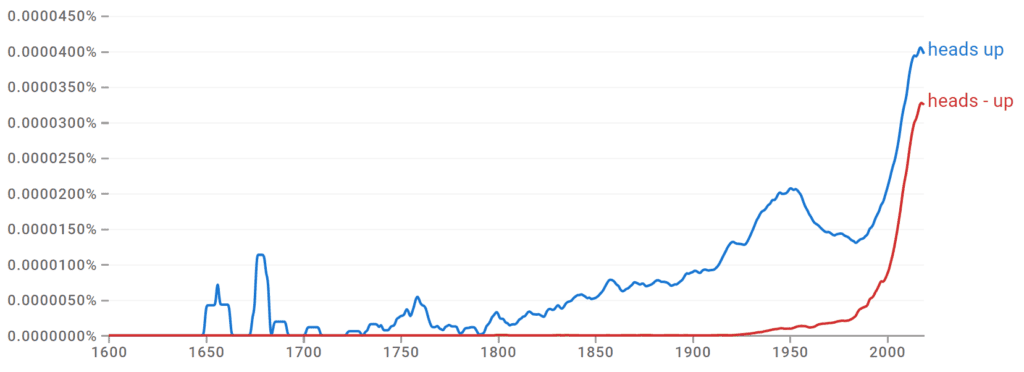The English language is full of phrases that sound like nonsense when taken in a literal sense. To an English language learner, or someone just building their vocabulary, these phrases are confusing and difficult to use in speech and writing.
However, when used properly, they help convey emotion and emphasis to create concise communication. Mastering the English language can be difficult, but with consistent practice and understanding of some of the more nuanced phrases, your language skills will improve.
The interjection heads-up is the perfect example of a phrase that is used to add a flair of emotion or warning to your speech. Let’s look at what it means and some examples of heads-up in sentences so you can masterfully tie it into your speech and writing.
Heads-Up Definition

Heads-up is an interjection or exclamation used when you need to warn someone to look out. A heads-up is the actual warning you gave the individual. This is commonly used in the phrase giving someone a heads-up.
For example:
- My boss gave me a heads-up concerning the audit, so we would be prepared in advance to fill out all the paperwork.
- It wouldn’t hurt to give them a heads-up, so they knew what to expect.
- I gave my kids a heads-up that we wouldn’t be able to afford a vacation next summer.
Heads-up can also be used as an adjective to describe a person as being cautious or aware of surroundings. Keeping one’s head up means being watchful.
For example:
- He kept a heads-up awareness while walking through the schoolyard after dark.
- It won’t hurt to be a heads-up scholar and keep your eyes open for those academic financial aid offers.
Be aware that the verb head up can also mean to lead, so to say, “She heads up the project” means that she directs the project.
For example:
- I’m going to head up the first crew so we can assess the initial damage from the fire.
- He is heading up the new journalism desk, and hopefully, we can finally get some newsworthy stories back in print
A head-up display is a gauge or reading which does not require the pilot or driver to lower his or her eyes. It can also be called a heads-up display.
For example:
- Glancing at the heads-up display, he was able to match the horizon to the gauge for a level landing.
A related term is “to head up,” which is used in sailing to mean steer into the wind.
For example:
- I need you to quickly head up before the storm breaks so we can get safely into a slip.
The Origin of Heads-Up

The origin of the phrase heads-up is debatable but likely came from its use in a literal sense. Observation of animals raising their heads in awareness, calling out heads up to look up, and use as a military term in the 19th Century for soldiers to hold their heads up on the march have all been documented in both speech and writing.
Over time, the literal use became a common interjection and adjective and integrated a hyphen to indicate Its use as a compound phrase. While the correct modern spelling includes the hyphen, original usage since the 17th Century omits the hyphen.
Let’s Review
Heads-up is a phrase that, when used correctly, works as an interjection to give a warning. It also can be used as an adjective or to describe the location of display or direction in sailing in a more literal sense.
Even though its use can confuse new English learners, it is a common term that, when used properly, adds emotion and clarity to speech and text.

Comments are closed.